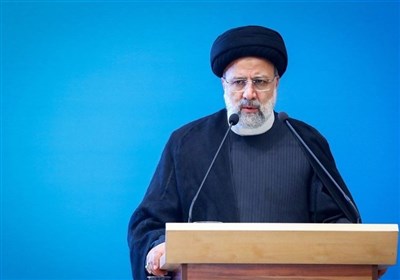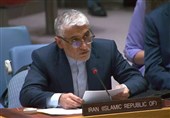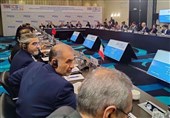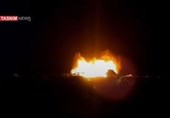NAM Asks for UNSC’s Impartiality
TEHRAN (Tasnim) - The Non-Aligned Movement (NAM) called on the United Nations Security Council (UNSC) to take an unbiased line on the international developments, refrain from quick resort to use of force for addressing the disputes and not remain silent on many other cases of illegal actions.
“NAM rejects the use of the Security Council as a tool to pursue national and political interests,” Iran’s Ambassador to the United Nations Gholam Ali Khoshroo said at a Security Council open debate on the Working Methods of the Council, held in New York on Tuesday.
He was speaking on behalf of the NAM, whose rotating presidency is assumed by Iran.
What follows in the full text of Mr. Khoshroo’s speech:
Mr. President,
I have the honor to speak on behalf of the Non-Aligned Movement. First, let me express NAM's appreciation to you, Mr. President and Spanish Presidency, for holding this sixth Security Council annual open debate on Council working methods and presenting the concept paper on this issue. NAM welcomes this open debate since it provides an opportunity for the entire UN membership to express their views on Security Council working methods and encourages the broader membership to participate in this debate.
Mr. President,
For NAM, transparency, openness and consistency are key elements that the Security Council should observe in all its activities, approaches and procedures. We regret that the Council has neglected these important elements in numerous instances, including reluctance in convening open debates on some issues of high significance, unscheduled open debates with selective notifications, repeatedly restricting participation in some of the debates and discriminating between members and non-members of the Council particularly with regard to sequencing and time limits of statements during the open debates, etc.
In view of the time limit and the fact that the NAM's position on the subject at hand are reflected in the NAM Final Document, I only confine myself to the following specific measures that NAM calls for in order to improve the working methods of the Council and enhance efficiency in fulfilling its primary responsibility:
1. The Rules of Procedure of the Security Council, which have remained "provisional" for 70 years, should be formalized in order to improve its transparency and accountability;
2. The number of public meetings should be increased, in accordance with Articles 31 and 32 of the Charter, and that these meetings should provide real opportunities to take into account the views and contributions of the wider membership of the UN, particularly non-Council members whose affairs are under the discussion of the Council;
3. Closed meetings and informal consultations should be kept to a minimum and as the exception, not the rule, as they were meant to be. They also should include briefings by the Special Envoys or Representatives of the Secretary-General and the UN Secretariat;
4. The establishment of subsidiary organs by the Council should be in accordance with the letter and spirit of the UN Charter, and that these organs should function in a manner that would provide adequate and timely information on their activities to the general UN membership;
5. Annual reports of the Security Council to the General Assembly should be more explanatory, comprehensive and analytical, assessing the work of the Council, including such cases in which the Council has failed to act, and the views expressed by its members during the consideration of the agenda items under its consideration. We also call on the Security Council to elaborate the circumstances under which it adopts different outcomes whether resolutions, presidential statements, press statements or elements to the press;
6. The Council, pursuant to Articles 15 (1) and 24 (3) of the UN Charter, should submit special reports for the consideration of the General Assembly;
7. The Council should ensure that its monthly assessments are comprehensive and analytical, and issued in a timely fashion. The General Assembly may consider proposing parameters for the elaboration of such assessments;
8. The Council should fully take into account the recommendations of the General Assembly on matters relating to international peace and security, consistent with Article 11 (2) of the Charter; and
9. The Council should stop ongoing attempts to shift issues under the agenda of the General Assembly or the ECOSOC to the Security Council, and the encroachment by the latter on the functions and powers of the Assembly.
Mr. President,
NAM rejects the use of the Security Council as a tool to pursue national political interests and agenda, since this practice aggravating rather than alleviating situations, contrary to its mission enshrined in the Charter and reiterates the necessity of non-selectivity, impartiality and accountability in the work of the Council. The decision by the Security Council to initiate formal or informal discussions on the situation in any Member State of the United Nations or any issue that does not constitute a threat to international peace and security is contrary to Article 24 of the Charter. In such cases, There is a need for the Council to strictly remain within the powers and functions accorded to it by Member States under the UN Charter.
In recent years, the Security Council has been too quick to threaten or authorize enforcement action in some cases while being silent and inactive in others. Furthermore, the Council has been increasingly resorting to Chapter VII of the Charter as an umbrella for addressing issues that do not necessarily pose an immediate threat to international peace and security. A careful review of these trends indicates that the Council could have opted for alternative provisions to respond more appropriately to particular cases. Instead of excessive and quick use of Chapter VII, efforts should be made to fully utilize the provisions of Chapters VI and VIII for the pacific settlement of disputes.






